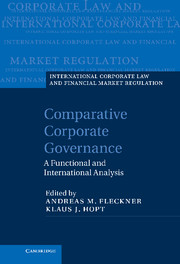3 - China
Corporate governance of business organizations
from A - Australia and Asia
Published online by Cambridge University Press: 05 July 2013
Summary
General information on corporate governance
Corporate governance (Chinese: 公司治理, gongsi zhili) has become a hot topic in China in recent years. In 1994, the first Company Law came into effect; this was subsequently amended in 1999, 2004, and (with major changes with regard to corporate governance issues) in 2005 (“Company Law”).
In 2002, a “Code of Corporate Governance for Listed Companies” (“Corporate Governance Code”) was issued by the China Securities Regulatory Commission (“CSRC”), an agency with oversight of the Chinese securities markets. The binding effect of the code is unclear. The CSRC may “instruct” the companies to make corrections in accordance with the Code. The Code requires a listed company to disclose information regarding “the actual state of corporate governance of the company, the gap between the company's corporate governance and the Code, and the reasons for the gap.” However, of course, if the rest of the Corporate Governance Code is not deemed to be mandatory (and this is indicated by this “comply-or-explain” approach), it is hard to see how the disclosure requirement itself could be mandatory. Unfortunately, Chinese legislators did not take the opportunity to insert such a (mandatory) “comply-or-explain” rule in the amended Company Law of 2005. This ambiguity regarding its binding effect applies also to the very recently issued “Basic Regulation of Internal Control” (“Regulation”) that came into force on July 1, 2009. The Regulation requires “large and medium-sized” enterprises to establish certain internal control mechanisms, but it is silent on the question of legal consequences enterprises will face if they do not. It therefore only fills the role of guidance and suggestions, though these are very strong and very formal. Many listed corporations have included the principles of the “Basic Regulation of Internal Control.” However, the practical effects need to be observed.
- Type
- Chapter
- Information
- Comparative Corporate GovernanceA Functional and International Analysis, pp. 156 - 207Publisher: Cambridge University PressPrint publication year: 2013
References
- 7
- Cited by

